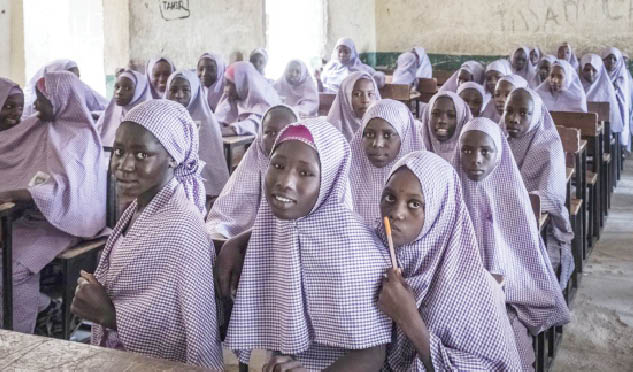Girl-child education campaign driving Northern women
In the past, little or no special attention was paid to girl-child education especially in the northern part of Nigeria as enrolment of girls in schools was at low level with retention and completion figures that are not encouraging. With the popular statement, when you educate a woman you educate a nation, one used to […]

Girls in school in a northern state
In the past, little or no special attention was paid to girl-child education especially in the northern part of Nigeria as enrolment of girls in schools was at low level with retention and completion figures that are not encouraging.
With the popular statement, when you educate a woman you educate a nation, one used to wonder if this could be true in the region.
Research shows that many girls do not have access to adequate education past a certain age. In 2010, the female adult literacy rate (ages 15 and above) for Nigeria was 59.4% in comparison to the male adult literacy rate of 74.4%.
A Professor of African Studies, Prof. Toyin Falola, has identified the growing awareness on girl-child education in northern Nigeria as a major factor in the increased participation of women in governance, businesses and nation building.
Falola who is also the Jacob and Frances Sanger Mossiker Chair in the Humanities at the University of Texas, United States was the keynote speaker at the national conference on women and gender history, held at the Usmanu Danfodiyo University, Sokoto.
In a statement made available to Daily Trust in Lagos, Falola who spoke on the topic, ‘Nigerian Women in History: Past And Present’, described the future of women in Nigerian socio-economic and political landscapes as one that is showing promising signs.
“While in the past, there have been a minute number of female entrepreneurs in the corporate world; recent times have seen their number increase significantly,” he said.
“The number of new businesses owned by women in Nigeria points to a prospective increase in the number of women consciously venturing into corporate business ownership. Judging by this trend, it is expected that in the future, Nigeria will witness an increasing number of female corporate entrepreneurs who will be versatile and courageous enough to delve into sectors that have been hitherto designated as male-oriented sectors,” Falola noted in the statement.
The don however expressed regret that in contemporary Nigerian society, the woman’s situation in employment and politics has still not improved as it should.
“Women are still subjugated and oppressed and continue to fight for their place in the society. Only a tiny fraction of women have been able to look past some of the unfavorable customs that endorse and encourage patriarchy to actually pursue their interests and carve themselves a space in the predominantly patriarchal Nigerian society,” the professor’s statement read.
